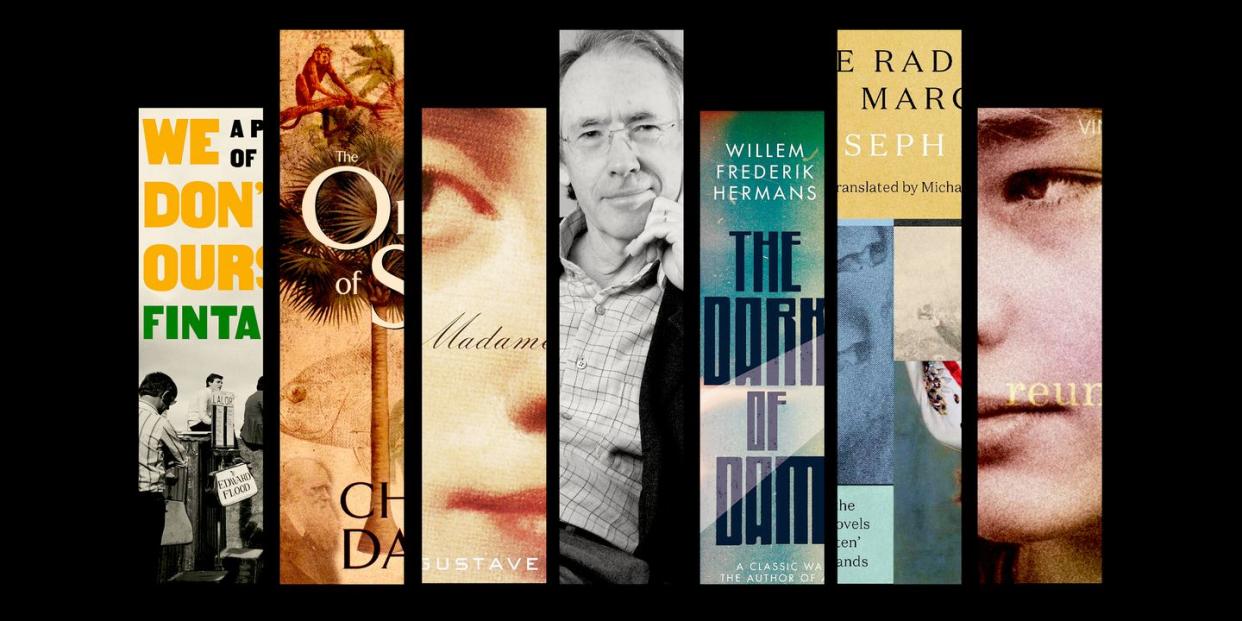Ian McEwan on James Joyce, 'Middlemarch,' and the Book That Made Him Miss a Train Stop

- Oops!Something went wrong.Please try again later.
- Oops!Something went wrong.Please try again later.
- Oops!Something went wrong.Please try again later.
- Oops!Something went wrong.Please try again later.
"Hearst Magazines and Yahoo may earn commission or revenue on some items through the links below."
Welcome to Shelf Life, ELLE.com’s books column, in which authors share their most memorable reads. Whether you’re on the hunt for a book to console you, move you profoundly, or make you laugh, consider a recommendation from the writers in our series, who, like you (since you’re here), love books. Perhaps one of their favorite titles will become one of yours, too.
After a travel-packed 2019, Ian McEwan had planned to stay put in London to write in 2020. The global pandemic made sure of that, and the result is his 17th novel, Lessons (Knopf), which chronicles a man’s lifetime spanning historical events including the Berlin Wall and Brexit, Chernobyl and COVID-19. Nominated six times for the Man Booker Prize, the author won for Amsterdam. Many of his works have been adapted to film (he has written some of the screenplays), including the National Book Critics Circle Award-winning Atonement (original title: An Atonement), which starred Keira Knightley and Saoirse Ronan and won the Best Film BAFTA and Best Original Score Oscar of seven Oscar nominations; The Children Act (starring Emma Thompson); and On Chesil Beach (starring Ronan).
From a military family, the Hampshire-born, Cotswolds- and London-based author moved around in his youth including spells in Singapore and Libya, has been awarded a CBE and the Bodeleian Medal, was once mistaken for a CIA agent in Grenada, and doesn’t finish a TV series.
Likes: walking, chamber music and blues, holidays. Dislikes: passport control and immigration lines, the “happy birthday” song. Good at: squash and making roast potatoes. Not so good at: Persistence, tennis second serve. Give one of his book picks a spin.
The book that…
…made me miss a train stop:
The Caine Mutiny by Herman Wouk. I missed three stops, aged 15. An obsolete minesweeper in WW2, a disheveled crew, a cowardly captain, with loyalty and reason in contest.
…made me weep uncontrollably:
Madame Bovary by Gustave Flaubert. Uncontrollably no, but wet-eyed on first reading the extended, operatic death of Emma.
…I recommend over and over again:
The Dead by James Joyce. The perfect fiction. An entire world conjured, love, loss, death and the harshness of time beautifully evoked.
...shaped my worldview:
The Female Eunuch by Germaine Greer. Back in 1970, this book seemed to arrive explosively from nowhere. At the age of 21, I began to think for the first time about the nature of masculinity.
...made me rethink a long-held belief:
The Radetzky March by Joseph Roth. I thought that revolutions apart, political orders shifted slowly. Then I read of the intricacy and solidity of the Austro-Hungarian empire crumbling under the force of history. Americans beware!
...I read in one sitting, it was that good:
Youth by Joseph Conrad. Conrad’s autobiographical tale of his first command, which turns out to be in a rowboat, fleeing a sinking ship with its cargo of burning coal.
…currently sits on my nightstand:
We Don’t Know Ourselves by Fintan O’Toole. A brilliant merging of the personal and the political in this history of Ireland’s struggle to become a modern, secular state.
…I’d pass on to my kid:
God is Not Great by Christopher Hitchens. I am the proud dedicatee of this eloquent statement of rational humanism.
…I’d gift to a new graduate:
On the Origin of Species by Charles Darwin. Natural selection formed the variety of all living things—“there is grandeur in this view of life.”
…made me laugh out loud:
The Bech trilogy by John Updike. Bech is Updike’s Nobel Prize-winning, Jewish alter ego, whose literary career rises, nosedives, and rises again. By the end, Bech murders his various hostile critics and is heroically damned by a dying victim.
…I’d like turned into a Netflix show:
We Had to Remove This Post by Hanna Bervoets. A crazy milieu. A group of young people work shifts for a tech company, taking down disgusting or false posts. Daily confrontations with the worst in human nature drives them to drink and through shifting relationships.
…I first bought:
Under the Net by Iris Murdoch. Philosophy, sex, kidnapping, fireworks. I read it, fascinated, at the age of 14 and barely understood it. But it made me impatient for my adult life to begin.
...I last bought:
The Darkroom of Damocles by Willem Frederik Hermans. He is one of the great, under-celebrated masters of European fiction. First published in 1958, this novel was much praised by John le Carré and considered by some to be one of the best novels to come out of the Second World War.
...has the best title:
What Katy Did by Susan Coolidge. The elegant, summarizing title of a much-loved children's book. Did Henry James borrow the structure for What Maisie Knew? I’ve sometimes wondered about using it myself for a crime novel, What Frank Did. Subtitle: And was never caught.
...has the best opening line:
Herzog by Saul Bellow. “If I am out of my mind, it’s all right with me, thought Moses Herzog.”
..has the greatest ending:
Reunion by Fred Uhlman. A superb short novel about a love affair between two German schoolboys in the thirties as Nazism takes hold. The entire weight of the narrative is carried in the very last line.
...everyone should read:
Middlemarch by George Eliot. It’s probably the greatest English novel. Eliot gives us her master class in novelistic control. She shows how fiction and reflections on life can be woven exquisitely together.
...that holds the recipe to a favorite dish:
In Nigel Slater's Appetite you will find a fast, simple recipe for a delicious fish soup. I add zest of an orange.
You Might Also Like

